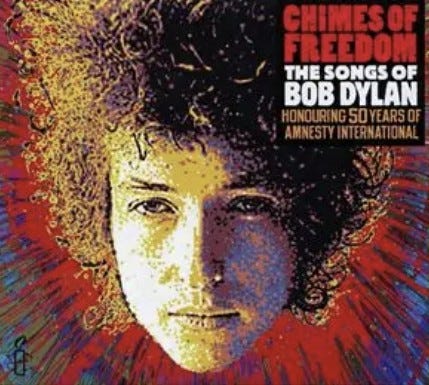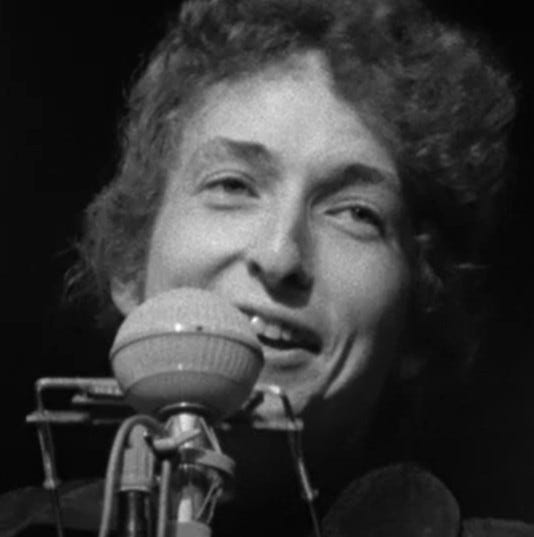Freedom Flashing
for Roberta Rakove
Substack intro
This post is dedicated to Roberta Rakove, who, in a conversation with Erin C. Callahan on Erin’s Substack, Infinity Goes Up on Trial, recalled Bruce Springsteen’s 1988 performance of Chimes of Freedom in what was then East Germany. You can hear her comments here:
However, the entire conversation is highly recommended and available here: "Chimes of Freedom Flashing"
In earlier drafts of my Dylan and Shakespeare book, I included Springsteen’s performance of Dylan’s masterful song in a chapter about authorities resisting theatre and rock music in their respective eras. That chapter also featured moments when Shakespeare’s or Dylan’s work intersected with history, such as Shakespeare’s company performing Richard II for the Earl of Essex’s doomed “rebellion”, or Dylan withdrawing from The Ed Sullivan Show.
Those earlier incarnations also included the use of “Chimes of Freedom” by Springsteen and Amnesty International. These were later reduced to two paragraphs and a brief note, respectively, before being dropped before publication as I had exceeded length guidelines and one reader remarked that “this is very interesting but I’m not sure why I am reading about it here.”
Roberta’s comments have prompted me to resurrect the paragraphs here and to round things off, I link to a chapter from my 2003 book, Troubadour on “Chimes of Freedom” which includes in its introduction a reference to another historical outing for the song, at the Clinton inauguration.
So, this time around, we have:
1 East Berlin 1988
2 Amnesty
3 Bill Clinton inauguration, January 1993
4 “Back to the starting point!” (Chapter from Troubadour)
***
1 East Berlin, July 1988
In July 1988, Bruce Springsteen played an extraordinary show in what was then East Berlin. Estimates of the crowd size range from 150,000 to nearly twice that, depending on whose figures you trust. Stasi police reports, released years later, confirmed what had long been part of local folklore: this concert played a significant role in the chain of events that culminated in the fall of the Berlin Wall the following year.
Pressure had been building among the young in the East for some time and not only in Berlin but across East Germany. The Springsteen concert provided a focal point for the ‘gathering of the tribes’ and trigged an explosive release of pent-up, communal tension. Which begs the question: why was the regime reckless enough to allow it to take place?
The answer lay in a miscalculated gamble in a desperate attempt to placate a growing tide of youth discontent. 1987 saw riot police battling with East Berliners who had gathered near the wall to hear concerts from David Bowie and the Eurythmics wafting over from the West, and to party the night away. Instead, they were met with truncheons and worse. Then, in 1988, when Michael Jackson and Pink Floyd played across the divide, soldiers were sent to force people back.
To avoid the prospect of tens of thousands gathering and the resultant risk of rebellious actions, the decision was taken to allow the staging of a Springsteen concert, strategically distant from the Wall. This risky policy was apparently based on the idea that, as Springsteen’s songs were of ‘the hard and unadorned and shady side of American reality’, they wouldn’t lead to anything dangerous. The huge crowd belting out the “I was born in the USA” chorus line seemed, unsurprisingly, unconcerned with that side of that song.
Immediately following that eruption of stage and crowd interchange, Springsteen introduced Dylan’s “Chimes of Freedom” to the vast, sprawling crowd. He read some words in German. He had been told not to mention “the Wall”, so he chose another word: “I've come to play rock'n'roll for you in the hope that one day all the barriers will be torn down," and he added "I bring you rock and roll with the hope that one day it will open the doors of freedom”. Then he and his band played “Chimes of Freedom”, with so many lines being pointedly apt:
Through the city's melted furnace, unexpectedly we watched
With faces hidden as the walls were tightening...
For the disrobed faceless forms of no position
Tolling for the tongues with no place to bring their thoughts...
An' for each unharmful, gentle soul misplaced inside a jail...
For the countless confused, accused, misused, strung-out ones an' worse...
The concert had the opposite effect to the one on which the authorities had gambled it would have. There is a book detailing its role in the fall of the Berlin Wall, Rocking the Wall: Bruce Springsteen: The Berlin Concert That Changed the World by Erik Kirschbaum which is replete with quotes from all sides on the effect that show had on history. A history professor from Berlin, Gerd Dietrich, states simply that: “Springsteen's concert and speech certainly contributed in a large sense to the events leading up to the fall of the wall."
Here is Bruce performing the song after the short speech in German: East Berlin, 1988
This has been reported in the Guardian as: “ The highlight of Springsteen's four-hour concert, in which he played a total of 32 songs, was undoubtedly a passionate speech, delivered in a creaky but understandable German, that carried a subtle but clear political message. "I'm not here for any government. I've come to play rock'n'roll for you in the hope that one day all the barriers will be torn down," he said to a crowd that erupted, before he launched into Bob Dylan's Chimes of Freedom, whose lyrics – about the "city's melting furnace … with faces hidden while the walls were tightening" – could hardly have resonated more with his captive audience, many of whom waved homemade American flags.[i]
2 Amnesty 1988 (and 2012)
“Chimes of Freedom” was also chosen by Amnesty to lead its cause. Amnesty are fond of choosing Dylan songs, aptly enough, as they came into existence more or less co-terminus with the start of Dylan’s career. The 50th anniversary of Amnesty, in 2012, was marked by a 4-CD set of artists covering Dylan songs called: “Chimes of Freedom: The Songs of Bob Dylan Honoring 50 Years of Amnesty International.” (Dylan’s lugubrious comment on Amnesty selecting his 60s songs as their anthems was that he would have preferred them to choose “In the Garden” from his evangelical Christian phase.)
As a result, Springsteen kept the “Chimes” flame flying for Amnesty that year, too. In Stockholm, in July, he prefaced the song by announcing:
“Earlier today Amnesty International announced a worldwide tour to celebrate the 40th anniversary of the Declaration of Human Rights. The Declaration Of Human Rights is a document that was signed by every government in the world 40 years ago recognizing the existence of certain inalienable human rights for everyone regardless of your race, your colour, your sex, your religion, your political opinion or the type of government that you're living under.
I was glad to be asked to participate and I'm proud to join Sting and Peter Gabriel, Youssou N'Dour, Tracy Chapman in a tour that's gonna begin in early September and is gonna run for about six weeks.
So, I'd like to get a... dedicate this next song to the people at Amnesty International and their idea. So, when we come to your town, come on out, support the tour, support human rights for everyone now and let freedom reign:
Well, far between sundown's finish and midnight's broken toll
We ducked inside the doorway, thunder crashing
As majestic bells of bolts struck shadows in the sound
Seeming to be the chimes of freedom crashing…”
You can listen to that, here: Chimes of Freedom (Live at Stockholm’s Olympiastadion, Stockholm, SE - July 1988)
Springsteen also featured Dylan’s song in his own “Tunnel of Love” tour of the time. Slightly earlier than Stockholm, in a show in Copenhagen, he opted for a perfect one-line introduction: This is one of the greatest songs about human freedom ever written.
Play: Copenhagen, 1988
Note: see links in “Substack Outro” for further reading on all of the above.
3 Bill Clinton inauguration, January 1993
This performance is discussed in the foreword to the following chapter:
4 “Back to the starting point!”
The original album version: Chimes', from 'Another Side...'
Here’s a link to my chapter on “Chimes” from Troubadour, incorporating a take that originally appeared in my first fanzine, Homer, the slut which allows me to answer The Joker and the Thief’s earlier request for some of my back pages to appear here.[ii]
From Troubadour: Early & Late Songs of Bob Dylan chapter 4 on “Chimes of Freedom”:
And, to end with, live from sixty-one years ago: Live, 1964
Substack Outro
Here’s some further reading on the first part of this posting for those wishing to delve deeper into it.
On the East Berlin show:
https://www.bbc.com/culture/article/20130626-how-springsteen-rocked-the-wall
https://www.theguardian.com/music/2013/jul/05/bruce-springsteen-east-germany-berlin-wall
On Amnesty:
Chimes of Freedom | Amnesty International USA 2012 - 50-year anniversary
And here is some info on the EP: https://en.wikipedia.org/wiki/Chimes_of_Freedom_(EP)
Finally, a major piece on all the elements, from “The Avid Listener”, Springsteen and Human Rights: “Chimes of Freedom”: https://theavidlistenerblogcom.wordpress.com/2021/03/08/springsteen-and-human-rights-chimes-of-freedom/
[i] https://www.theguardian.com/music/2013/jul/05/bruce-springsteen-east-germany-berlin-wall




Thank you so much for the acknowledgment! You have made my day.
Thank you for such a wonderful piece. As both a Bob and a Broooce freak, I’m always moved by the East Berlin performance. This is Deep Dylan writing of the highest quality.